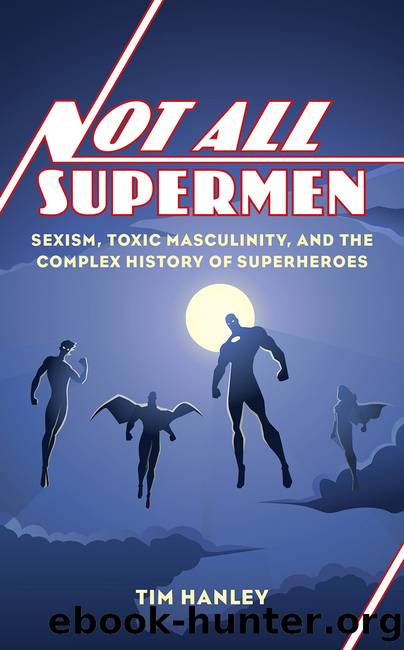Not All Supermen by Tim Hanley

Author:Tim Hanley
Language: eng
Format: epub
Publisher: Rowman & Littlefield Publishers
Published: 2022-05-19T00:00:00+00:00
CHAPTER 12
Barriers
In 2014, cartoonist ND Stevenson posted a comic strip about visiting comic book shops. A published creator with many friends in the industry, Stevenson ventured into shops to find the work of pals and colleagues, and was often met with customer service that was indifferent at best and downright insulting at worst. Some retailers didnât bother to offer assistance, and those who did often turned to mockery, dismissing Stevensonâs interest in non-superhero comics as invalid. Highly sexualized images of female characters sent the message, âThis is what we think of you,â while the complex, convoluted nature of superhero lines proved inaccessible. Ultimately, having been ignored and insulted, the strip concluded, âI donât go to comic shops anymore. Iâm tired of all this.â
The comic struck a chord. While Stevenson pointed out that not every shop was scornful or rude, it was a frequent experience that many others identified with, especially women and fans from marginalized genders. They werenât comfortable in comic book shops, in large part because little to no effort was made to welcome them. From the staff to the artwork to the comics themselves, not much was approachable or inviting. In many cases, the atmosphere was actively hostile.
Shows like The Big Bang Theory and The Simpsons have caricaturized comic book shops as inhospitable to newcomers, with disdainful employees who treat potential customers rudely, even cruelly. This caricature isnât far off base. Although there are many friendly, inclusive shops out there, a considerable number fit this rancorous mold to some degree. For several decades, as superhero publishers aggressively pursued male readers, comic book shops reflected this audience base. They were a predominantly male domain that catered to the most hard core of enthusiasts, creating the inaccurate notion that these were the only ârealâ fans. Anyone outside of this narrow group was an outsider, a phony rather than a true fan. There are innumerable accounts of condescending salesclerks interrogating women to prove their geek credibility with trivia questions, insisting that if they were a real fan they could name every Robin or provide a thorough account of Spider-Manâs life. Men tended to receive the benefit of the doubt, but women were inherently suspect.
The insular nature of these comic book shops was representative of certain segments of the superhero fan community from the 1980s on. For many fans, their passion for superheroes brought them a lot of grief. They were labeled nerds, bullied, and ostracized, and they turned to comics for escapism. Much like the young men who created the superhero genre in the 1930s, they found solace in a world where the bad guys were always defeated. The comfort they found in comics drew them in further, and their knowledge grew to encyclopedic levels as they devoured decades of lore across multiple universes. When these fans found each other, the result was a safe space where they could be as nerdy as they wanted to be, and they were wary of outsiders for fear of further bullying.
At the same time, the comics that offered them refuge didnât always serve them well.
Download
This site does not store any files on its server. We only index and link to content provided by other sites. Please contact the content providers to delete copyright contents if any and email us, we'll remove relevant links or contents immediately.
4 3 2 1: A Novel by Paul Auster(12356)
The handmaid's tale by Margaret Atwood(7732)
Giovanni's Room by James Baldwin(7303)
Asking the Right Questions: A Guide to Critical Thinking by M. Neil Browne & Stuart M. Keeley(5742)
Big Magic: Creative Living Beyond Fear by Elizabeth Gilbert(5729)
Ego Is the Enemy by Ryan Holiday(5395)
The Body: A Guide for Occupants by Bill Bryson(5066)
On Writing A Memoir of the Craft by Stephen King(4921)
Ken Follett - World without end by Ken Follett(4708)
Adulting by Kelly Williams Brown(4554)
Bluets by Maggie Nelson(4535)
Eat That Frog! by Brian Tracy(4502)
Guilty Pleasures by Laurell K Hamilton(4428)
The Poetry of Pablo Neruda by Pablo Neruda(4082)
Alive: The Story of the Andes Survivors by Piers Paul Read(4011)
White Noise - A Novel by Don DeLillo(3992)
Fingerprints of the Gods by Graham Hancock(3980)
The Book of Joy by Dalai Lama(3962)
The Bookshop by Penelope Fitzgerald(3829)
